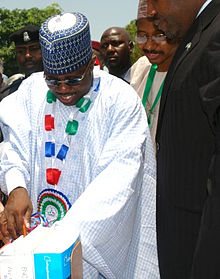
Back Kanuri (volk) Afrikaans كانوري Arabic كانورى ARZ Канури Bulgarian Kanuris Catalan Kanuriové Czech Kanuri Danish Kanuri (Volk) German Kanuroj Esperanto Pueblo kanuri Spanish
 Ali Modu Sheriff, a Kanuri politician and former Governor of Borno State, Nigeria, 2007 | |
| Total population | |
|---|---|
| 10,725,500[1][2][3][4] | |
| Regions with significant populations | |
| Nigeria, southeast Niger, western Chad, northern Cameroon and western Sudan | |
| 7,650,000 (2020)[1][2] Includes Manga | |
| 1,500,000 (2023)[4] Includes Manga, Yerwa, Bilma, and Tumari | |
| 1,071,000 (2019) Most of which are Kanembu subgroup[5][1] | |
| 381,000 (2022)[1] | |
| 180,000 (2024)[1] | |
| Languages | |
| Kanuri | |
| Religion | |
| Islam | |
| Related ethnic groups | |
| Kanembu, Zaghawa, Toubou, Nilo-Saharans | |
The Kanuri people (Kanouri, Kanowri, also Yerwa, Barebari and several subgroup names) are an African ethnic group living largely in the lands of the former Kanem and Bornu Empires in Niger, Nigeria, Chad, and Cameroon, as well as a diaspora community residing in Sudan.[6] Those generally termed Kanuri include several subgroups and dialect groups, some of whom identify as distinct from the Kanuri. Most trace their origins to ruling lineages of the medieval Kanem–Bornu Empire, and its client states or provinces. In contrast to the neighboring Toubou or Zaghawa pastoralists, Kanuri groups have traditionally been sedentary, engaging in farming, fishing the Chad Basin, trade, and salt processing.[7]
- ^ a b c d e "Yerwa Kanuri". Ethnologue. Retrieved 5 December 2023.
- ^ a b "Manga Kanuri". Ethnologue. Retrieved 5 December 2023.
- ^ "Tumari Kanuri". Ethnologue. Retrieved 5 December 2023.
- ^ a b "Africa: Nigeria the World Factbook – Central Intelligence Agency". www.cia.gov. 2023. Retrieved 5 December 2023.
- ^ "Kanembu". Ethnologue. Retrieved 5 December 2023.
- ^ "Africa | 101 Last Tribes – Kanuri people". www.101lasttribes.com. Retrieved 23 January 2021.
- ^ Idrissa, Abdourahmane; Decalo, Samuel (2012). Historical Dictionary of Niger. Scarecrow Press. ISBN 978-0-8108-7090-1.